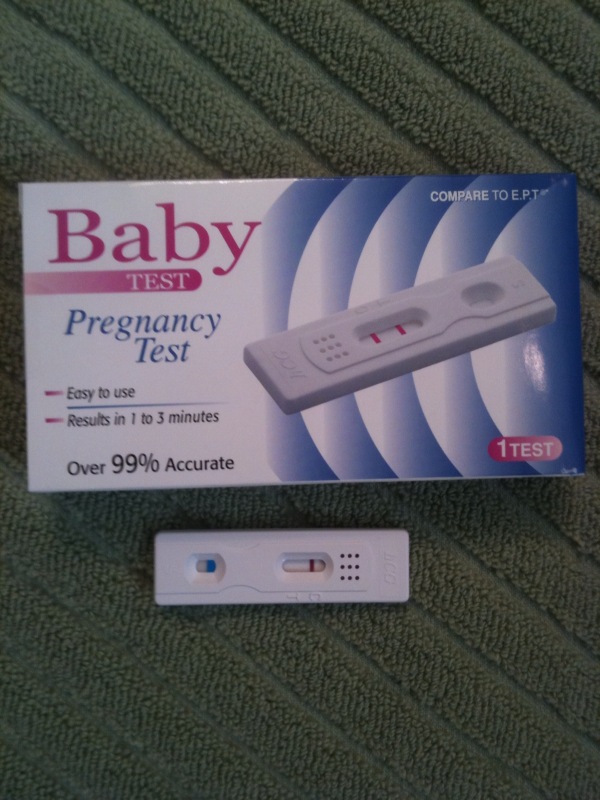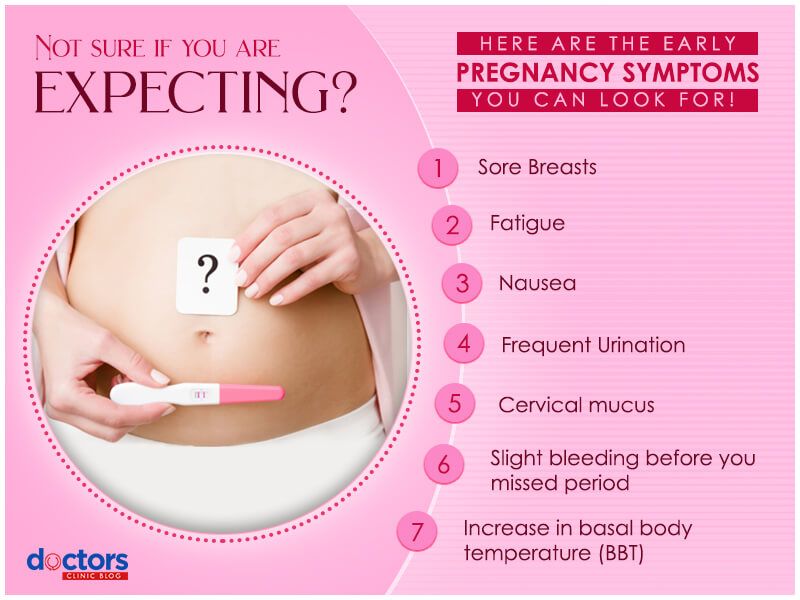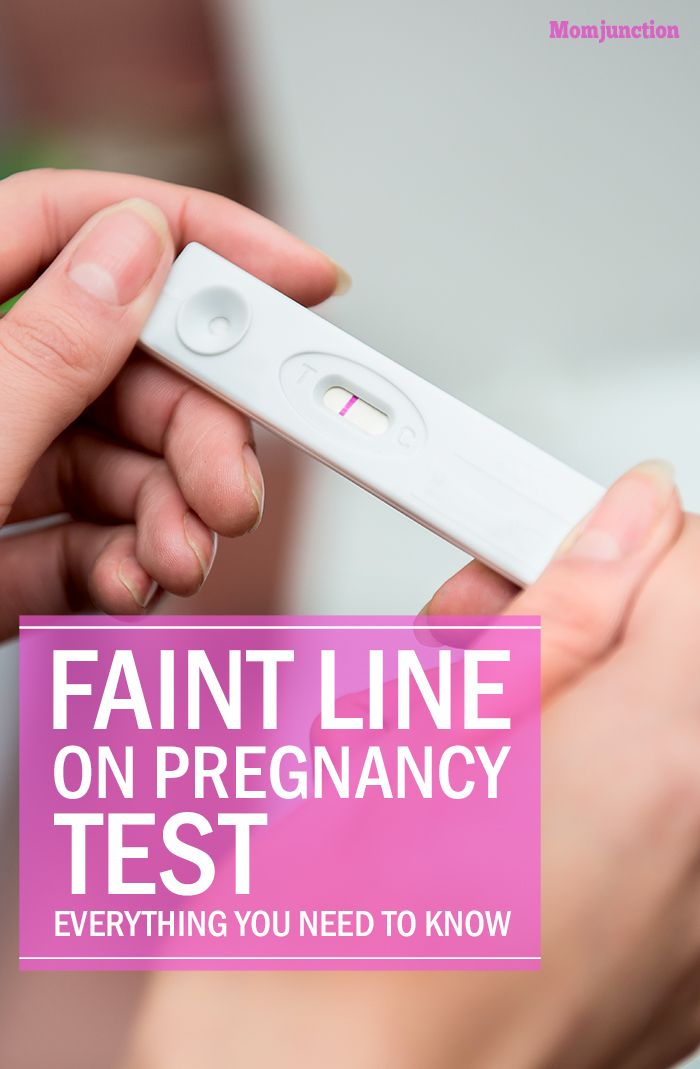The pregnancy test
When to Take a Pregnancy Test
How do pregnancy tests work?
Pregnancy tests are an easy and accurate way to find out if you’re pregnant — you just pee on a stick. They’re inexpensive and available at most drug and grocery stores.
How accurate are pregnancy tests?
Pregnancy tests are super accurate when you use them correctly. The pregnancy tests you get at the drugstore work 99 out of 100 times. They’re just as accurate as a urine pregnancy test that you’d get at a doctor’s office.
Pregnancy tests work by checking your urine (pee) for a hormone called human chorionic gonadotropin (HCG). Your body only makes this hormone if you’re pregnant. HCG is released when a fertilized egg attaches to the lining of your uterus — when pregnancy begins. If your pregnancy test results are positive, it means you're pregnant. If they’re negative, it means you’re not pregnant.
Pregnancy tests are most accurate when you take them after you’ve already missed your period.
A pregnancy test will be less accurate if it’s expired or if you don’t use it the right way. So always check the expiration date on the package, and carefully read the directions that come with your pregnancy test.
How soon can I take a pregnancy test?
You can take a pregnancy test anytime after your period is late — that’s when they work the best. It’s a good idea to take a pregnancy test as soon as possible if you miss your period or think you might be pregnant.
The earlier you know you’re pregnant, the sooner you can start thinking about your options and get whatever care you need to stay healthy.
Many pregnancy tests say they work a few days before a missed period, but the results are usually less accurate then. Read the label on your pregnancy test to find out when to take a pregnancy test and how accurate it’ll be.
Sometimes a pregnancy test is able to find pregnancy hormones in your urine as early as 10 days after unprotected sex. But these results aren’t super reliable, and you may get a false positive or false negative test result.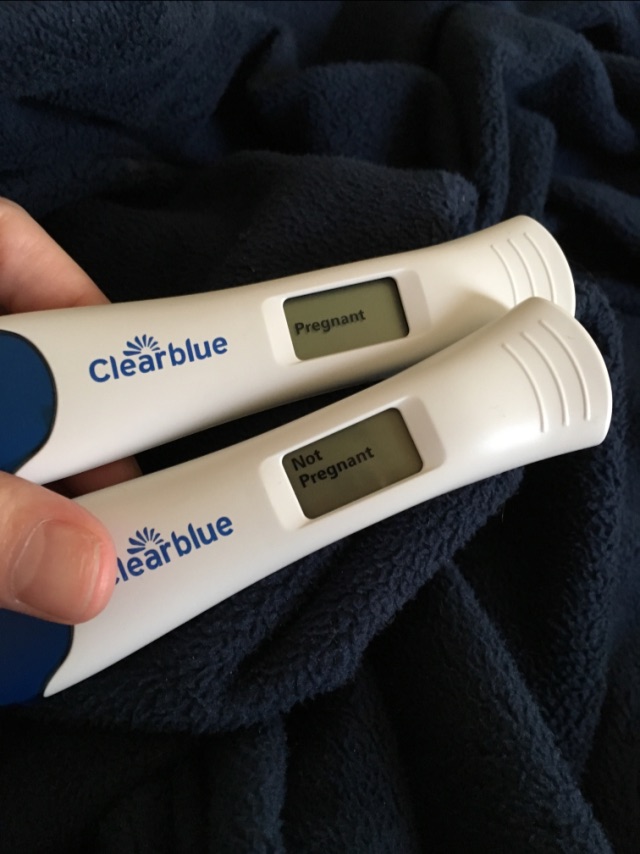
If your periods are very irregular, or you don’t get periods at all for one reason or another, your best bet for accurate results is to take a pregnancy test 3 weeks after sex.
Where can I get a pregnancy test?
You can buy a pregnancy test at your local pharmacy, drugstore, grocery store, and some convenience or dollar stores. Pregnancy tests are usually inexpensive — they can cost as little as a dollar. Sometimes you can get a free pregnancy test at certain health centers.
You can also get a pregnancy test from your nurse or doctor, community clinic, or local Planned Parenthood Health Center. Most health centers use the same urine pregnancy tests that you can buy in stores. Sometimes they use a blood test to test for pregnancy, but that’s usually only under special circumstances.
But be careful when looking for a reliable health center, because there are fake clinics out there called Crisis Pregnancy Centers. Crisis Pregnancy Centers give free pregnancy tests and claim to offer information and help. But they’re run by people who may not be medical professionals, and don’t believe in giving you honest facts about pregnancy and all of your options. Crisis pregnancy centers are often located very close to Planned Parenthood health centers or other real medical centers, and have similar names — they do this to confuse people and trick them into visiting their center instead.
But they’re run by people who may not be medical professionals, and don’t believe in giving you honest facts about pregnancy and all of your options. Crisis pregnancy centers are often located very close to Planned Parenthood health centers or other real medical centers, and have similar names — they do this to confuse people and trick them into visiting their center instead.
Your nearest Planned Parenthood health center can help you find a safe place to get a pregnancy test in your area.
What should I do if my pregnancy test is positive?
If you take a pregnancy test after you miss your period and the result is positive, that means you’re pregnant. You can always take another test to be sure, if you want.
You may want to go to a nurse or doctor, family planning clinic, or local Planned Parenthood Health Center to get a follow-up test. They’ll talk with you about your pregnancy options, and help get you the care you need. Be careful not to visit a Crisis Pregnancy Center, because they might not give you real medical care or truthful information about your pregnancy and all of your options.
More questions from patients:
What's a false positive pregnancy test?
A false positive pregnancy test is when you get a positive result from a home pregnancy test but you’re not really pregnant.
A false positive result means that the pregnancy test detected the hormone hCG in your pee. For this to happen, either the test didn’t work right or you had hCG in your body for another reason. These could include:
If you have a positive pregnancy test, visit your doctor, midwife, or local Planned Parenthood health center. They can determine if you’re really pregnant and help you with next steps.
Was this page helpful?- Yes
- No
Help us improve - how could this information be more helpful?
How did this information help you?
Please answer below.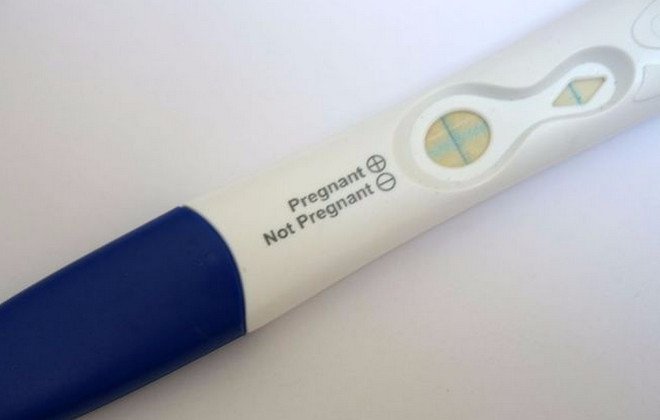
Are you human? (Sorry, we have to ask!)
Please don't check this box if you are a human.
You’re the best! Thanks for your feedback.
Thanks for your feedback.
When To Take, Types & Accuracy
Overview
How Does a Pregnancy Test Work?What is a pregnancy test?
A pregnancy test is a way to determine if you’re pregnant. If your pregnancy test is positive, it means you’re pregnant. If the test is negative, it means you aren’t pregnant. Pregnancy tests work by detecting human chorionic gonadotropin (HCG), a hormone your body makes when you’re pregnant.
From the very beginning of pregnancy, your body starts to go through changes to support the cells that will develop into your baby. One thing that happens very quickly is the production of HCG. If you’re pregnant, your body starts to produce more HCG. Your HCG levels start to build up once the fertilized egg implants in your uterus — about six to 10 days after conception.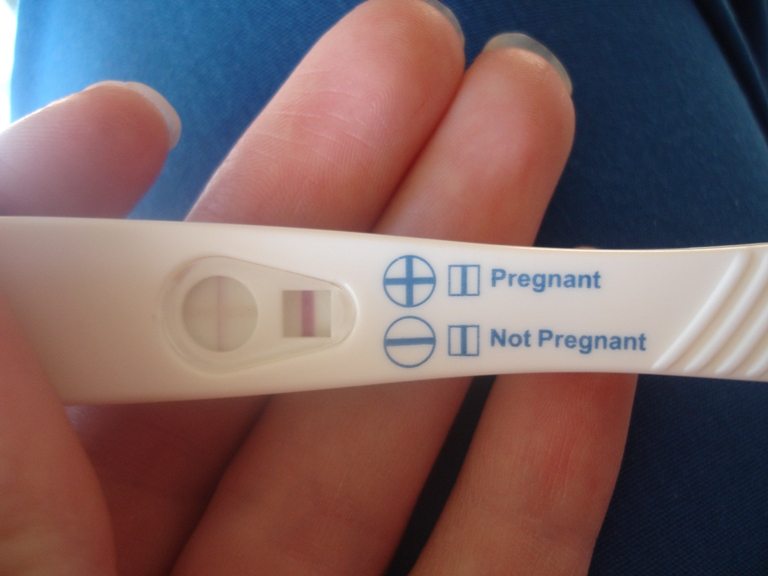
There are two main types of pregnancy tests — urine tests and blood tests. Often, you’ll take a urine test at home with a home pregnancy test. This type of test is available over the counter (you don’t need a prescription from your healthcare provider) and in a variety of price ranges. Blood tests to check for pregnancy happen in your healthcare provider’s office and involve giving a sample of your blood. The other way to confirm a pregnancy is by using an ultrasound. Your provider performs an ultrasound in their office.
There are several reasons why you might take a pregnancy test. You could be trying to get pregnant and hoping for a positive result. You might have experienced an issue with your birth control. You might even be about to have a medical procedure or start a new medication that could be complicated by pregnancy. No matter what the reason, if you ever have any questions about your test results, the best thing to do is reach out to your healthcare provider.
What hormone levels are checked for a pregnancy test?
Pregnancy tests look for an elevated amount of HCG. Levels of HCG rise quickly – doubling every few days in the first weeks of pregnancy. The placenta produces HCG. Only pregnant people have a placenta, which develops shortly after a fertilized egg attaches to your uterine wall.
Levels of HCG rise quickly – doubling every few days in the first weeks of pregnancy. The placenta produces HCG. Only pregnant people have a placenta, which develops shortly after a fertilized egg attaches to your uterine wall.
When should I take a pregnancy test?
If you think you could be pregnant, it’s a good idea to take a test and make sure. Home pregnancy tests can differ in how early they’ll detect a pregnancy. In many cases, you might get a positive result from an at-home test as early as 10 days after conception. For a more accurate result, wait until after you’ve missed your period to take a test. Remember, if you take a test too soon, it could be negative even if you’re pregnant. If you get a negative test and then miss your period, take another test.
What time should I take a pregnancy test?
In general, the best time is when you have your first morning pee. However, some pregnancy tests are sensitive enough to detect HCG no matter what time of day you take the test. When possible, try to wait until it’s been three hours since your last pee before you take the test. You could also take two pregnancy tests to confirm you get the same result.
When possible, try to wait until it’s been three hours since your last pee before you take the test. You could also take two pregnancy tests to confirm you get the same result.
Test Details
How do pregnancy tests work?
When you take a pregnancy test, it’s looking for the amount of human chorionic gonadotropin (HCG) in your body. You can find HCG in your pee or blood. HCG needs time to build up in your body. Each day of early pregnancy, your body will create more HCG. As the weeks go on, you’ll have more and more HCG in your body, which will make it more likely that a pregnancy test will show as positive. This means if you take a test too soon, it will come back negative.
Pregnancy tests work by reacting to the amount of HCG in either your pee or blood. In a urine test, a piece of reactive paper detects the HCG. This test might show a plus sign, double vertical lines or even the word “pregnant.” Different tests will show a positive result in unique ways. Read the directions that come with the test to know what a positive result will look like. For example, most tests have a control window that shows up first. Seeing a symbol in this window will tell you that the test is working. Keep in mind that different brands of tests will take different amounts of time to show a result.
For example, most tests have a control window that shows up first. Seeing a symbol in this window will tell you that the test is working. Keep in mind that different brands of tests will take different amounts of time to show a result.
If you take a blood test, your provider will take a sample of your blood and send it to a lab. The lab will determine the amount of HCG in your blood. Your provider will contact you with your results.
What are the different types of pregnancy tests?
There are two main types of pregnancy tests: urine and blood tests.
Urine tests are typically done at home — though you can have a urine test done at your healthcare provider’s office — while your provider performs a blood test.
At-home pregnancy test
An at-home test uses your pee to look for HCG. They contain special strips that detect HCG. Most at-home pregnancy tests are about 99% effective when used correctly. That’s about the same accuracy rate as pregnancy tests done in your healthcare provider’s office.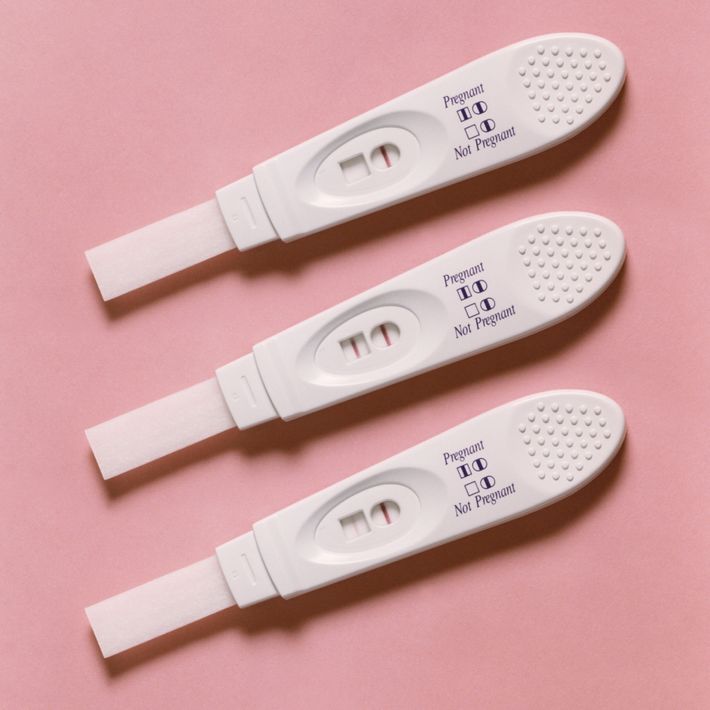 These tests are available in most drug or grocery stores. They’re easy to use and inexpensive. It’s important to read the instructions on these tests before taking them.
These tests are available in most drug or grocery stores. They’re easy to use and inexpensive. It’s important to read the instructions on these tests before taking them.
There are three ways to take an at-home pregnancy test:
- Pee in a clean cup. Then, place one to several drops of your pee on a chemical strip.
- Place the pregnancy test strip in your urine stream while you pee.
- Pee in a clean cup and then dip the test strip in the pee while it’s still in the cup.
For many of these tests, HCG can be detected in your urine about 10 days after conception. However, taking it after you miss your period reduces the chance of getting a false-negative result. A missed period typically happens around 14 days after conception.
There are a few things to keep in mind when you take a home pregnancy test, including:
- Use your first morning pee if you can. This is the time of day when your HCG levels will be the most concentrated and easily detected.
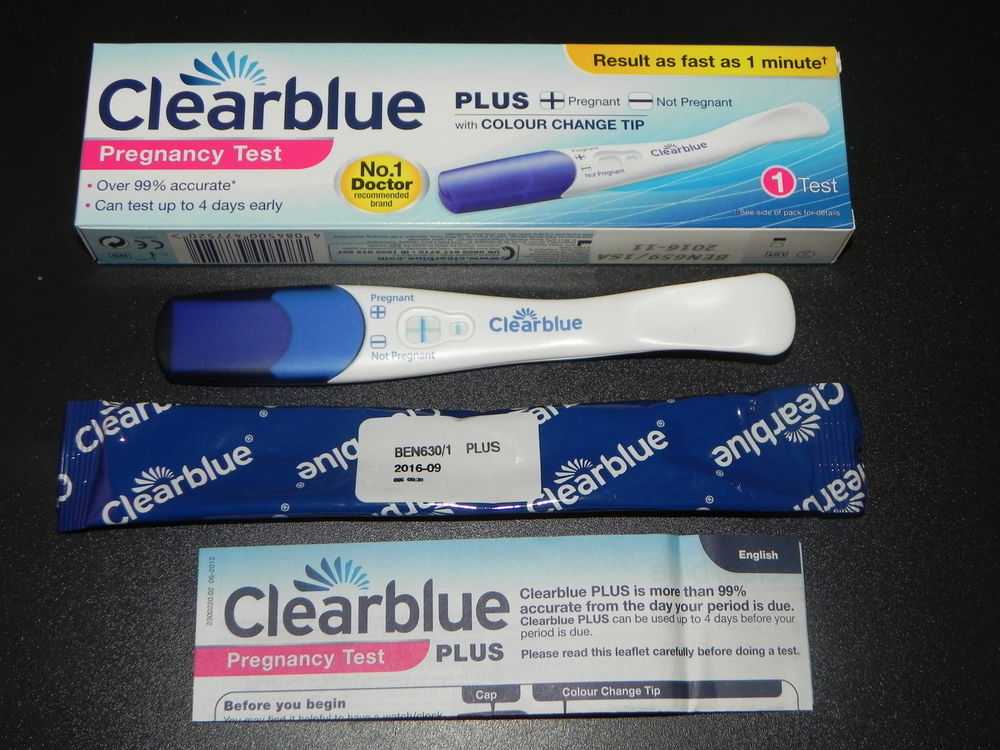 If you do it at another time of day, try to make sure your pee has been in your bladder for at least three hours.
If you do it at another time of day, try to make sure your pee has been in your bladder for at least three hours. - Don’t drink excessive amounts of fluids before you take a pregnancy test. This can dilute (thin out) your HCG levels.
- Check the expiration date on the package.
- Read the directions that come with the test thoroughly before starting the test, and follow every step exactly.
Blood test
Another type of pregnancy test is a blood test. Blood tests are rarely done because they’re expensive and tend to have the same result as a urine test. This type of pregnancy test is done using a small sample of blood from a vein in your arm. This blood test not only detects whether the pregnancy hormone is in your body, but can also determine how much of the hormone is present. This is helpful for when your provider needs to know the exact amount of HCG in your blood, not just if there’s HCG in your blood.
A blood test for pregnancy might be done in special circumstances, such as for people who are having fertility treatments or when the healthcare provider thinks there might be a problem.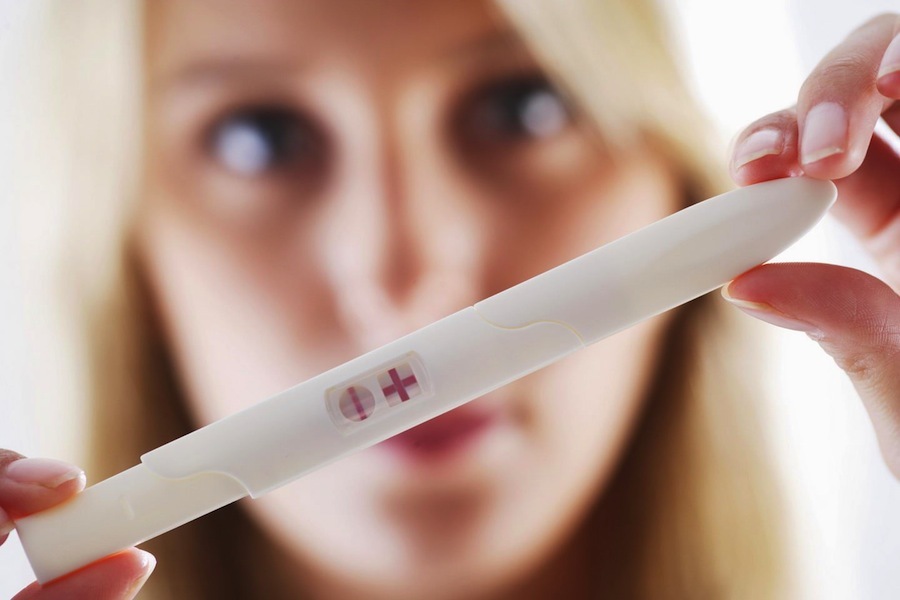
These blood tests are slightly more sensitive than urine tests because they can detect very small levels of HCG. That means they can provide a more accurate answer very early on in pregnancy — within seven to 10 days after conception. For this test, your blood sample is taken at your provider’s office or the hospital, then sent to a lab for analysis. Results might take anywhere from a few hours to two days.
Your provider might also choose to use a blood test to compare HCG levels during the pregnancy. Your HCG levels usually double about every two days during the first few weeks of pregnancy. If the levels don’t rise, it might suggest a problem with the pregnancy. Extremely high HCG levels might mean that you’re carrying twins or that there’s an issue with the pregnancy.
Are all home pregnancy testing methods the same?
Most brands of at-home pregnancy tests are reliable. Although the exact testing method of different pregnancy tests can differ from one type to the other, they all look for HCG in your body.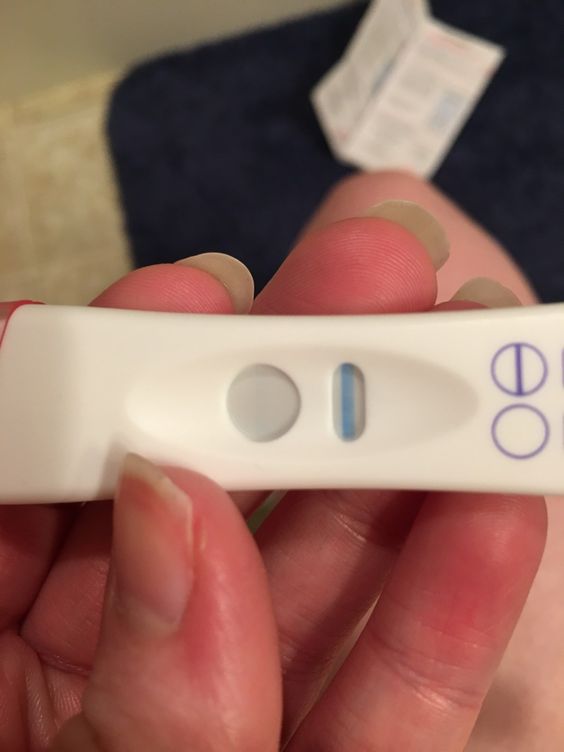 If you’re using an at-home test, most will give you the same result. The difference with your at-home tests will be the sensitivity of the test. Some might be more sensitive than others and produce a positive result (detect HCG in your urine) sooner than others. For the most accurate reading, it’s still recommended that you wait until you’ve missed your period. At that point, all tests should be accurate.
If you’re using an at-home test, most will give you the same result. The difference with your at-home tests will be the sensitivity of the test. Some might be more sensitive than others and produce a positive result (detect HCG in your urine) sooner than others. For the most accurate reading, it’s still recommended that you wait until you’ve missed your period. At that point, all tests should be accurate.
What are the advantages of using a home pregnancy test?
There are quite a few advantages to using a home pregnancy test, including:
- Pregnancy tests are inexpensive.
- They’re easy to use.
- Home tests provide results quickly.
According to pregnancy kit manufacturers, most at-home pregnancy tests are 98% to 99% accurate when you use them exactly as instructed. Positive results can be trusted, but you can get a false negative result if you take the test too soon.
Blood tests tend to be more expensive and inconvenient. However, blood tests can detect pregnancy sooner and are the only tests to show specific amounts of HCG in your body.
Is there anything you shouldn’t do before a pregnancy test?
Most pregnancy tests don’t ask you to avoid activities or change your lifestyle. The only medication that may interfere with your results is fertility medication containing HCG.
Here are some helpful tips you should follow for the best results:
- Read the instructions carefully before doing anything.
- Wait until you miss your period to take the test.
- Use your first pee or pee from a full bladder. Chugging water before your test in order to pee may affect your results.
Results and Follow-Up
How long does it take to get results of a pregnancy test?
Each home pregnancy test is different. Read the instruction manual carefully. It will tell you how many minutes to wait for your result. In most cases, you can expect to wait three minutes for your result. Keep in mind that if you wait too long to check your result, it may be inaccurate.
Even a faint line on a pregnancy test could mean you’re pregnant.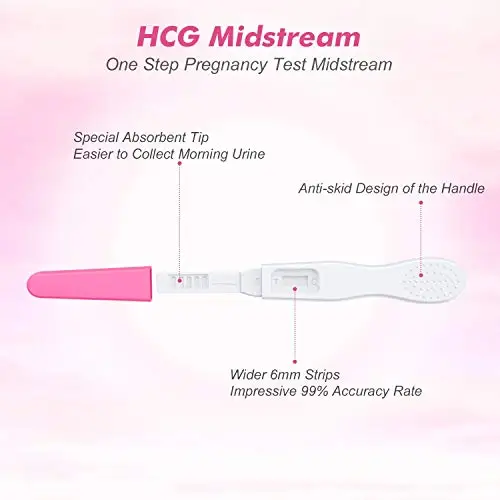 Your test will also have a control window that indicates that you took the test correctly. The instructions with your test will outline all of this. If you have any questions or remain unsure of your result after several tests, please contact your healthcare provider.
Your test will also have a control window that indicates that you took the test correctly. The instructions with your test will outline all of this. If you have any questions or remain unsure of your result after several tests, please contact your healthcare provider.
A faint line is different than an evaporation line. An evaporation line may appear if you wait too long to check your results — meaning your pee is dry. Most tests ask you to read your results before 10 minutes. This ensures the pee doesn’t dry up and you don’t get an evaporation line.
How soon will a pregnancy test be positive?
It depends on which type of test you use. Some at-home pregnancy tests may be able to detect pregnancy before you miss your period. However, if you want the most accurate result, it’s best to wait until you have missed your period.
How accurate are pregnancy tests?
Pregnancy tests are about 99% accurate when you use them correctly.
How common are false results on pregnancy tests?
False results — either a false negative or a false positive — mainly happen due to using the test incorrectly.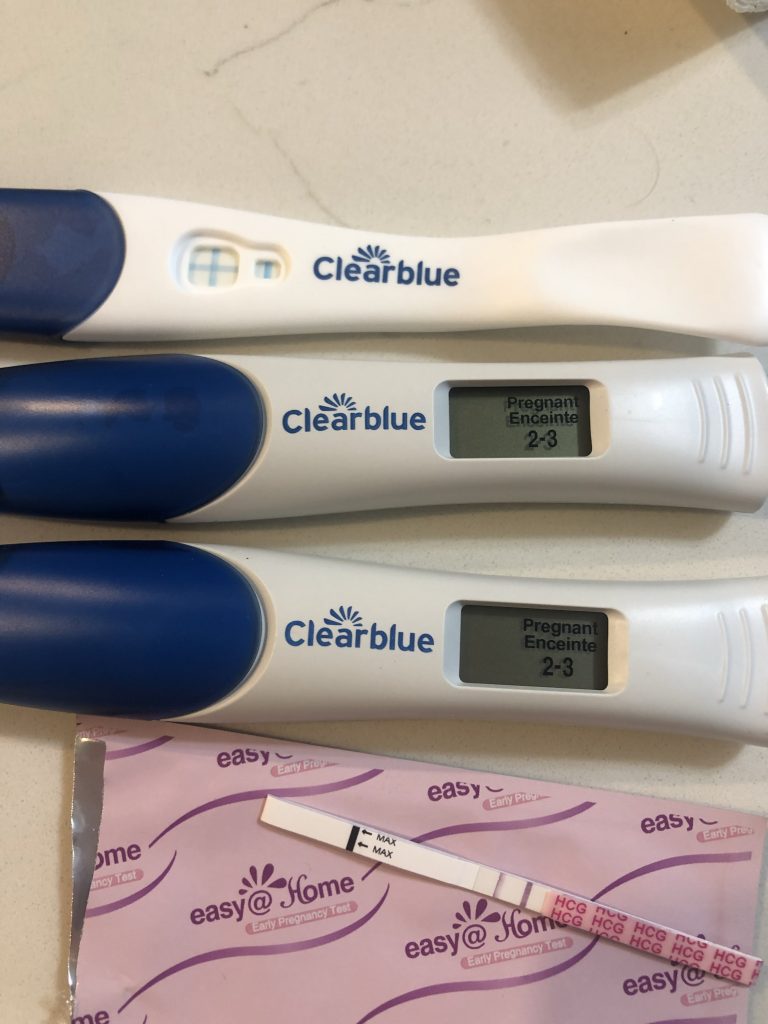 The main reason for a false-negative is testing too early. You might also get a false-negative if you use a home test incorrectly, such as using too much or too little pee. It’s important to follow the directions on your test kit to make sure you get an accurate result.
The main reason for a false-negative is testing too early. You might also get a false-negative if you use a home test incorrectly, such as using too much or too little pee. It’s important to follow the directions on your test kit to make sure you get an accurate result.
Can a positive test be wrong?
A false positive is rare, but it can happen. This may be the case if you experience a chemical pregnancy or lose the pregnancy shortly after the fertilized egg attaches to your uterine wall.
What type of pregnancy test confirms pregnancy first?
A blood test confirms pregnancy first because it can detect a smaller amount of HCG as compared to a test that uses your pee.
Are there any medications that can change the result of my pregnancy test?
For the most part, medications don’t change your pregnancy test results. Antibiotics, pain relievers and alcohol don’t impact your test results.
However, fertility drugs are one exception. These medications can sometimes cause a false-positive on your pregnancy test.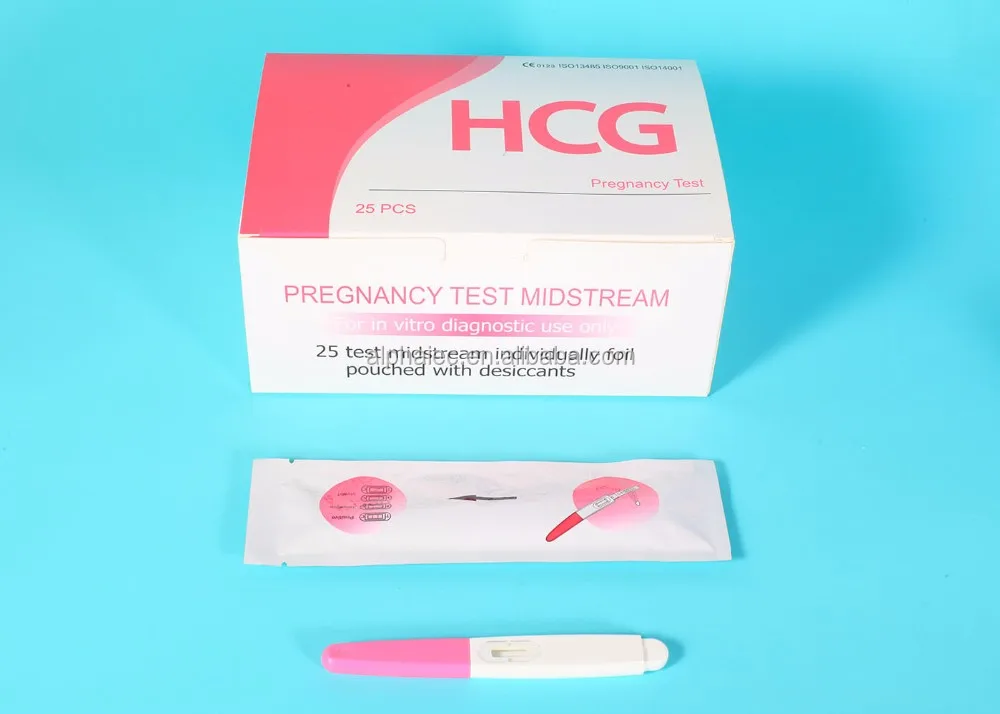 If you’re taking fertility medications, reach out to your healthcare provider about your results to make sure they’re accurate.
If you’re taking fertility medications, reach out to your healthcare provider about your results to make sure they’re accurate.
What should I do after getting a positive pregnancy test?
If you take a pregnancy test at home and it’s positive, there are a few things you should do, including:
- Take your prenatal vitamins. Pick a vitamin with folic acid included in the ingredient list. Start taking these while you’re trying to conceive, if possible. This is because the folic acid can help prevent complications during fetal development.
- Call your healthcare provider for an appointment. This appointment might not happen for several weeks — but it’s a good idea to call your provider and make an appointment.
- Make sure to pursue healthy habits like not drinking alcohol or smoking during pregnancy. You may also want to limit the amount of caffeine you consume each day during pregnancy.
Additional Details
Will an ectopic pregnancy show up on a pregnancy test?
Yes, you’ll still have a positive result on a pregnancy test if you have an ectopic pregnancy.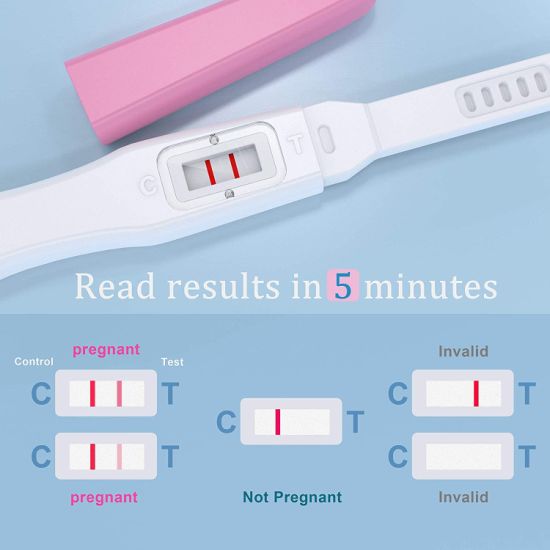
A note from Cleveland Clinic
Pregnancy tests are how a person finds out if they’re pregnant. Most people take a pregnancy test at home using their pee. However, you can also take a pregnancy test at your provider’s office using a blood sample or pee. For the most accurate results, wait until you miss your period to take a home pregnancy test. If you use pregnancy tests correctly, the results are 99% accurate. Contact your healthcare provider if you have questions about the results of your pregnancy test.
Series Pregnancy Test watch online for free all series in a row in good HD 1080 / 720 quality
Obstetrician-gynecologist Natalya Bakhmetyeva talks to the patient Nefedova lying under a dropper: the dynamics worsened, let's discuss the options, I called the urologist. Nefedova: if he removes my second kidney, it will make some sense. Bakhmetyeva: it's risky to wait, I suggest delivery at 31 weeks. Nefedova refuses: Kolmogorov said that I could hold out for another 3-4 weeks, I want to give birth to a healthy child.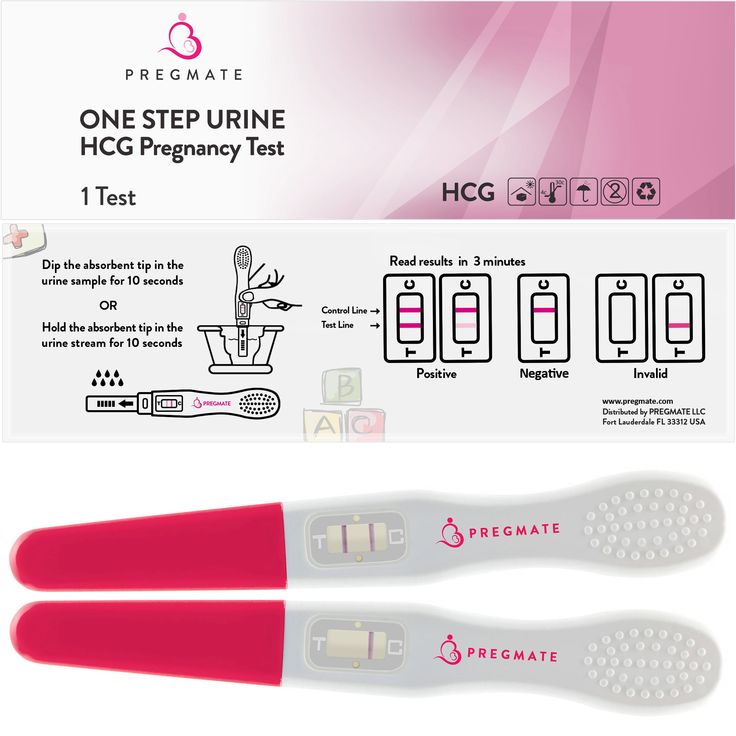 I knew what I was getting into - the only kidney, chronic pyelonephritis. I decided everything - I want to convey. Did Kolmogorov guide you from the very beginning of your pregnancy? Yes, I chose the best doctor. When he sent me to you, he said that I could decide for myself if there were options. And they are.
I knew what I was getting into - the only kidney, chronic pyelonephritis. I decided everything - I want to convey. Did Kolmogorov guide you from the very beginning of your pregnancy? Yes, I chose the best doctor. When he sent me to you, he said that I could decide for myself if there were options. And they are.
Bakhmetyeva unsuccessfully tries to get through to Kolmogorov. Bakhmetyeva approaches the head physician of the clinic, Ilya Yakovlevich, and says that Nefedov needs to be operated on urgently. What about Kolmogorov? Not available. The head physician says that with such urgency, Bakhmetyeva, instead of pulling him, could take the initiative into her own hands. At this moment, Bakhmeteva is summoned to Nefedova. The patient has stopped breathing. The resuscitator does her intubation and chest compressions. Nefedova is taken to the operating room. But, despite all the efforts of Bakhmetyeva and her colleagues, the patient dies on the operating table. The child is saved.
Bakhmetyeva drives up to the RAMS building. She leaves Kolmogorov a message on the answering machine: come down, I'm downstairs. But then she sees Kolmogorov leaving the building. Bakhmetyeva tells him: if you are interested, Yuri Alekseevich, then Nefedova Nadezhda Grigorievna died during the operation. Kolmogorov told her that at 46 years old with one kidney, you can give birth to a hero and a genius on the 40th week. Yura, I called you a hundred times... Kolmogorov says: stop acting like a quivering student, it's time for you to make your own decisions, it's time to grow up. Understand! Leaving Natalya, Kolmogorov heads to his wife, who meets him near the car. She asks her husband: who is this? My student. Kolmogorov kisses his wife, they get into the car and drive away.
She leaves Kolmogorov a message on the answering machine: come down, I'm downstairs. But then she sees Kolmogorov leaving the building. Bakhmetyeva tells him: if you are interested, Yuri Alekseevich, then Nefedova Nadezhda Grigorievna died during the operation. Kolmogorov told her that at 46 years old with one kidney, you can give birth to a hero and a genius on the 40th week. Yura, I called you a hundred times... Kolmogorov says: stop acting like a quivering student, it's time for you to make your own decisions, it's time to grow up. Understand! Leaving Natalya, Kolmogorov heads to his wife, who meets him near the car. She asks her husband: who is this? My student. Kolmogorov kisses his wife, they get into the car and drive away.
Bakhmetyeva submits a letter of resignation of her own free will. Ilya Yakovlevich: you're not to blame, don't punish yourself. Losing a patient on the operating table is always a tragedy, but it happens. Bakhmetyeva: don't comfort me, just sign the application, I won't change my mind.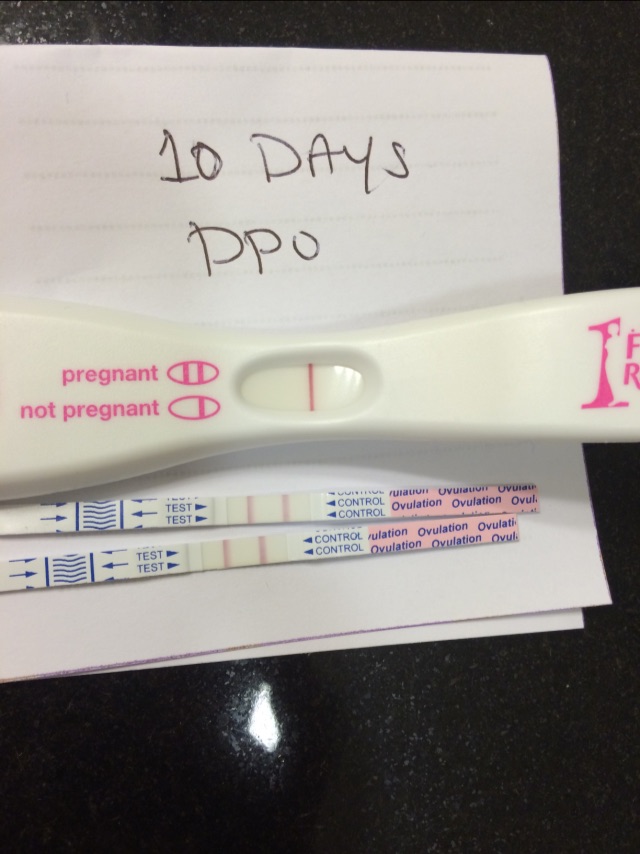 Ilya Yakovlevich: But you understand that without Kolmogorov's blessing they won't let you into any shop in Moscow now. Bakhmeteva: fortunately, there are shops not only in Moscow. Having signed the application, Ilya Yakovlevich reports: a couple of weeks ago, an old acquaintance, the head doctor of a clinic in a northern city, called me, he was looking for the head of the observation - young, promising.
Ilya Yakovlevich: But you understand that without Kolmogorov's blessing they won't let you into any shop in Moscow now. Bakhmeteva: fortunately, there are shops not only in Moscow. Having signed the application, Ilya Yakovlevich reports: a couple of weeks ago, an old acquaintance, the head doctor of a clinic in a northern city, called me, he was looking for the head of the observation - young, promising.
Late in the evening, Bakhmetyeva is loading things into the trunk of her car. Kolmogorov arrives: Natasha, what's going on? Why do you need to drop everything at once - a clinic, a dissertation? Running away in the middle of the night, not answering my calls - what kind of kindergarten? Bakhmetyeva: Don't you understand? The man is dead. Kolmogorov: Yes, sometimes patients die. And what? Analyzed, saddened - we go further. Bakhmetyeva: Here I am going. Kolmogorov: to whom and what are you proving? What can you do without me? You lived with me for ten years. Yura, to live is when under one roof.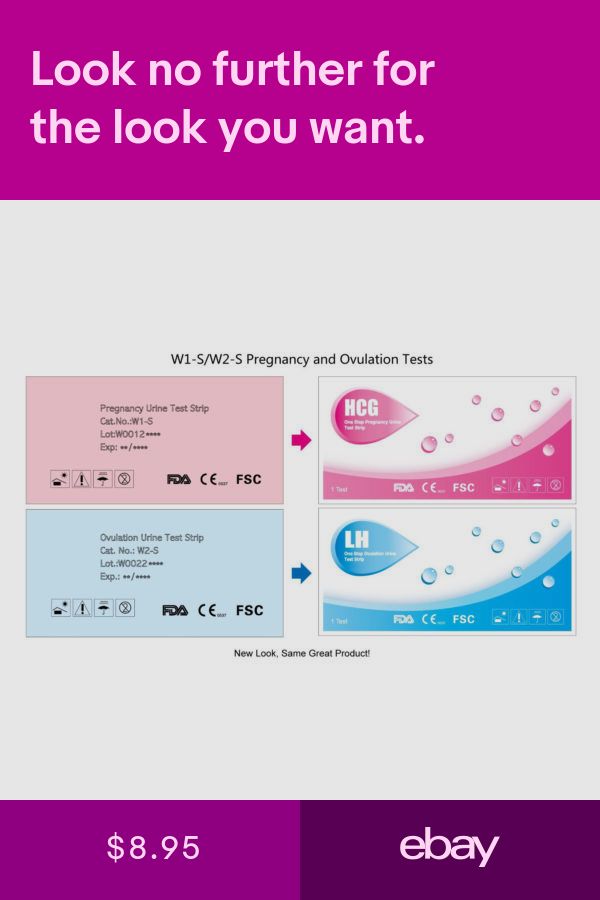 So you wanted a simple philistine happiness? I know too little about him to want. But I know exactly what I don't want anymore. Thinking you have a man when you don't. Telling yourself that working around the clock and seeing you once a week is okay. Thanks for reminding me how old I am. I'm going to grow up and find out what I want.
So you wanted a simple philistine happiness? I know too little about him to want. But I know exactly what I don't want anymore. Thinking you have a man when you don't. Telling yourself that working around the clock and seeing you once a week is okay. Thanks for reminding me how old I am. I'm going to grow up and find out what I want.
Bakhmetyeva arrives in St. Petersburg.
Obstetrician-gynecologist Alla V. Kashina sleeps in her office after celebrating her anniversary with her colleagues the day before. Kashina is 50 years old. She is awakened by a phone call: another patient has been brought to the clinic. Kashina puts himself in order and goes to the emergency department. She asks: what do we have here? The waters broke forty hours ago. Kashina examines the patient, commands: a gurney! In her operblock, quickly! The husband of the woman in labor remains in the ward, he is dressed in a Hare Krishna outfit, reciting mantras.
Bakhmetyeva drives up to the clinic building where she will now work.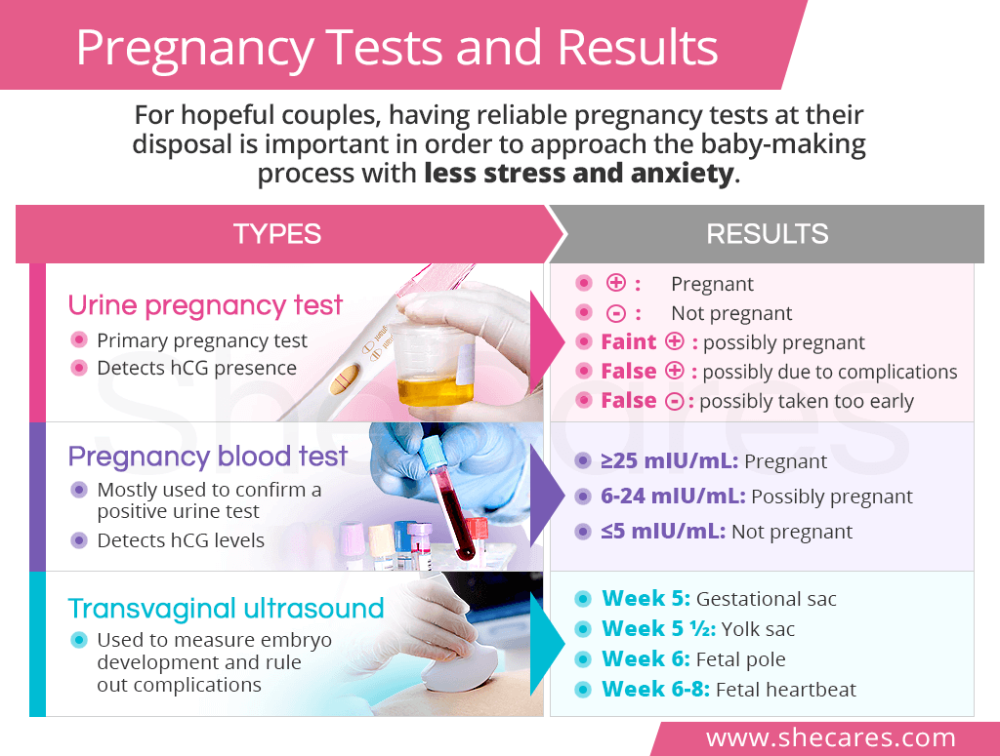 The security guard refuses to let her into the parking lot. He refers to the instructions: your car is not on the list, I don't know you, no one warned me about you, you don't have a pass either. Bakhmetyeva says she can call the head physician. The guard declares that he has his own superiors, to whom he submits. Bakhmetyeva leaves her passport as a pledge so that they let her through.
The security guard refuses to let her into the parking lot. He refers to the instructions: your car is not on the list, I don't know you, no one warned me about you, you don't have a pass either. Bakhmetyeva says she can call the head physician. The guard declares that he has his own superiors, to whom he submits. Bakhmetyeva leaves her passport as a pledge so that they let her through.
Midwife Evgenia Efimovna Mishina, known by her colleagues as Misha, is trying to hear the heartbeat of a Hare Krishna patient's fetus using a wooden tube. A young obstetrician-gynecologist is interested in: what is there, Misha? If I can't hear it with my ear, then it doesn't exist. Kashina enters the operative block, reports: the head physician is unavailable. Mishina turns to Kashina: the fetus is dead, it is necessary to do a fruit-destroying one. Leave her uterus, fool, because the first child does not need to be the last. Irritated Kashina pulls the midwife: Evgenia Efimovna, mind your own business. The offended Mishina departs. Appears anesthesiologist Alexander Anatolyevich Dontsov: well, what do we have here? Kashin: supravaginal amputation, due to prolonged anhydrous. Dontsov sighs: it means that her fate is to be childless. Kashina: I would like children, I would not give birth at home.
The offended Mishina departs. Appears anesthesiologist Alexander Anatolyevich Dontsov: well, what do we have here? Kashin: supravaginal amputation, due to prolonged anhydrous. Dontsov sighs: it means that her fate is to be childless. Kashina: I would like children, I would not give birth at home.
In the corridor, intern Pavel Samoryadov fills in the case history of a newly admitted patient. Misha is standing nearby, she grumbles: why immediately shred the table and the uterus? Previously, a dead fetus was pulled out through a certain place, and the uterus was left in place. Bakhmetyeva comes up, says hello, looks into the medical history, is horrified and runs to the operating room. Mishina: what was that now? Paul: I don't understand.
Kashina lifts the scalpel over the patient's abdomen. Bakhmetyeva bursts into the operating room, she throws the surgical instruments prepared for the operation onto the floor. Kashina is indignant: why are outsiders in the operating block? Call security! Bakhmetyeva introduces herself, says that from today she is the head of the observation department. Then she commands: the patient to the delivery room, quickly!
Then she commands: the patient to the delivery room, quickly!
Mishina helps Bakhmetyeva remove the dead fetus. Pavel faints during this procedure. Dontsov brings the intern to his senses and puts him out into the corridor.
After a successful operation, Bakhmetyeva tells Pavel to leave his sensitivity for dates in the operating room - this is an unaffordable luxury. Bakhmetyeva is called by the head physician. When she leaves, Pavel asks Dontsov: who was right - Bakhmetyev or Kashin? He says: Kashina did what she was supposed to, but Bakhmetyeva swung at more. So you are for Bakhmeteva? No, I'm for mine. Kashina and I gave birth to half a division of children together, and I never liked doctors with God's syndrome.
Kashina reprimands the head physician of the clinic, Oleg Evgenievich Samoryadov (Pasha's father): well, you gave me a present for my anniversary. Couldn't you have at least warned me ahead of time? Samoryadov: Bakhmetyeva acted boldly and professionally, and she kept the uterus, which you wanted to cut into pieces, so as not to risk it.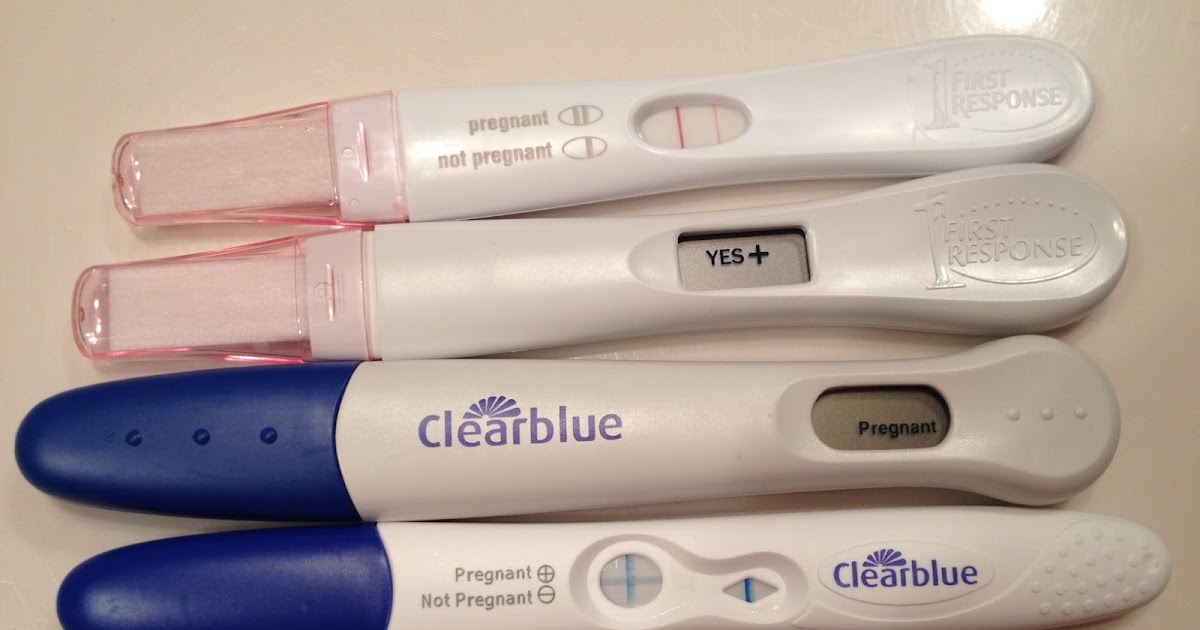 Yeah, and now the temperature will rise, and the uterus will still have to be removed, but only a septic one. You're screwing up! Go to work and don't disturb her. I will follow.
Yeah, and now the temperature will rise, and the uterus will still have to be removed, but only a septic one. You're screwing up! Go to work and don't disturb her. I will follow.
Bakhmetyeva enters the office. Kashina, pursing her lips, is removed. Samoryadov congratulates the new head of the observatory on her military entry into office. Just keep in mind for the future: such decisions are made by the council. Bakhmetiev: which still needs to be collected, and the risk of infectious complications increases. Samoryadov: I have no doubt that you are a good doctor, but what kind of head you will be is still unknown. You need to be able to build relationships with subordinates.
After the round, Bakhmetyev scolds Pavel. Why did you blurt out the patient about placental abruption? If the next time something seems to you, be patient until the corridor, take pity on the patient. Have you read her medical history? She had eight miscarriages! She has never made it past 30 weeks. Then Bakhmetyeva switches to Sechenov: I asked you to do an ultrasound, where is it? Sechenov is silent. Bakhmeteva leaves. Pavel: Does she even know how to talk normally? Sechenov: I'm worried about something else. I brought her cards half an hour before the round. How did she manage to study everything about 12 patients? I feel, Pasha, our free life is over. Kashina will be remembered later as a good king.
Then Bakhmetyeva switches to Sechenov: I asked you to do an ultrasound, where is it? Sechenov is silent. Bakhmeteva leaves. Pavel: Does she even know how to talk normally? Sechenov: I'm worried about something else. I brought her cards half an hour before the round. How did she manage to study everything about 12 patients? I feel, Pasha, our free life is over. Kashina will be remembered later as a good king.
IVF specialist Ruslan Bazanov enters the clinic building. Head nurse Dina Rafailovna shares with him the latest gossip about the new head of the observation. Having learned her last name, Bazanov drops a cup of coffee from his hands.
A patient comes to see Bazanov, who has been trying to get pregnant for 15 years. She underwent IVF 25 times, but to no avail. Bazanov assures that there are still chances of success. He sees no reason to refuse a woman who so wants to become a mother.
At lunchtime, Bakhmetyeva is relaxing on a bench in the clinic's yard. A Hare Krishna approaches her: why didn't you save my child? Because you marinated your wife at home for two days.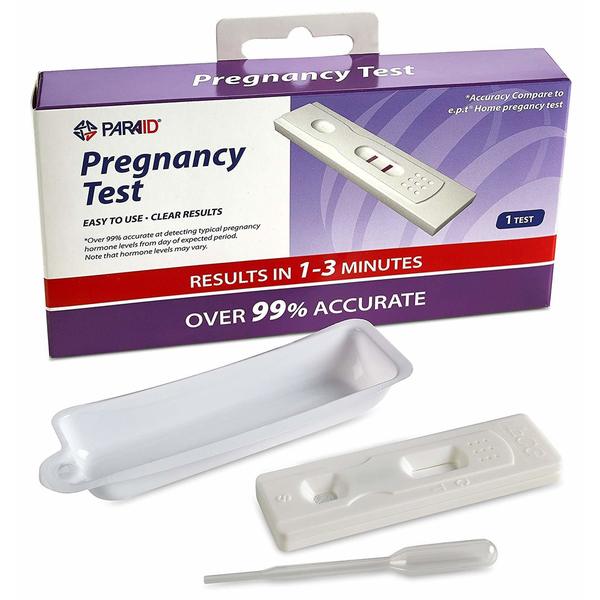 The Krishnaite is crying: do you also think that only obscurantists give birth at home? But after all, you can’t tear the child from the mother when he was born, the umbilical cord must not be cut, and the placenta must be buried. We wanted children so much. My wife couldn't get pregnant for two years. Then we went to India, and a miracle happened. Why didn't you save the child?
The Krishnaite is crying: do you also think that only obscurantists give birth at home? But after all, you can’t tear the child from the mother when he was born, the umbilical cord must not be cut, and the placenta must be buried. We wanted children so much. My wife couldn't get pregnant for two years. Then we went to India, and a miracle happened. Why didn't you save the child?
Neonatologist Andrei Lazarev enters the yard. He turns to the Hare Krishna: what is your name? Andrey. Listen, namesake, is your beloved woman still alive? Yes. This is the main thing. She can still give birth - also not bad. Let's go to her now, you will say that you love her. Lazarev leads the Krishnaite away.
Bakhmetyeva sees Bazanov getting out of the car that has driven up to the clinic. She recognizes her classmate, sneaks up behind him, closes her eyes with her hands: Ruslanchik-Bazanchik, a sunny boy. Bakhmetiev! Natalya hangs on Ruslan's neck. He says you haven't changed at all. And you grew up and became even more beautiful, aren't you ashamed? Bakhmetyeva asks: where is the buffet? I haven't seen food in days. Bazanov: buffet is not food. And you are still the same snob. A long-legged brown-haired woman in a medical gown comes out of the clinic building, greets Bazanov, and passes by. Bakhmetyeva: Is that sister Nicole Kidman? Bazanov: he is lying that he is the head of the laboratory. This is Olga Olshanskaya, a great clever girl. In love? But not in me. Bazanchik, well, can there really be someone who is not in love with you? You seem to be hungry, let's go eat.
Bazanov: buffet is not food. And you are still the same snob. A long-legged brown-haired woman in a medical gown comes out of the clinic building, greets Bazanov, and passes by. Bakhmetyeva: Is that sister Nicole Kidman? Bazanov: he is lying that he is the head of the laboratory. This is Olga Olshanskaya, a great clever girl. In love? But not in me. Bazanchik, well, can there really be someone who is not in love with you? You seem to be hungry, let's go eat.
Lazarev comes to the laboratory and asks Olshanskaya to do one analysis. Olshanskaya asks Lazarev about Bakhmeteva. He says that he saw her briefly, but already on the first occasion it is clear that she is a maximalist, it is difficult with such people. Olshanskaya: see you on Friday? Lazarev: I have children on Friday. On Saturday? Olshanskaya: I don't know. I have a sports club, a massage, then a meeting with a childhood friend. If, of course, you squeeze in... Lazarev kisses Olshanskaya: I'm compact.
In the dining room, Bazanov and Bakhmetyeva ask each other what has happened in the seven years they have not seen each other. Bakhmetyeva answers questions about her personal life and reasons for leaving Moscow evasively. Her phone rings. There was an accident, eight cars. A pregnant woman is among the victims.
Bakhmetyeva answers questions about her personal life and reasons for leaving Moscow evasively. Her phone rings. There was an accident, eight cars. A pregnant woman is among the victims.
At the emergency department, Pavel and Sechenov are waiting for the arrival of a patient injured in an accident. Suitable couple. A pregnant woman says that her five-year-old daughter kicked her in the stomach last night: it hurts very badly. Sechenov instructs Pavel to do an ultrasound. Kashina, walking towards him, says that Pavel should start the inspection, she will come later.
A patient is brought in after an accident, she is 40 weeks pregnant, has a hip injury and is bleeding. Kashina believes that the placenta has exfoliated. Bakhmetyeva gives her an order: take her to the operating unit, first a caesarean section, then a hip, call a traumatologist. Pavel approaches Kashina: what to do with the woman whom her daughter kicked in the stomach? Oh, I totally forgot. What is an ultrasound? I did, nothing is visible, but it seems that something is wrong.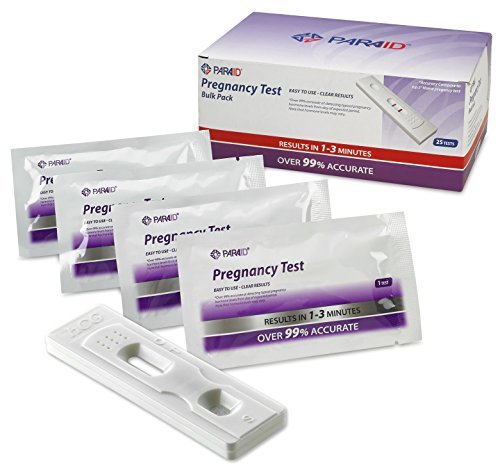 She complains of pain. Bakhmetyeva decides to deal with the patient. On examination, the woman grimaces in sharp pain. Is that a caesarean scar? Yes. Were there other surgeries? Myoma was cut out.
She complains of pain. Bakhmetyeva decides to deal with the patient. On examination, the woman grimaces in sharp pain. Is that a caesarean scar? Yes. Were there other surgeries? Myoma was cut out.
Bakhmetyeva and Pavel drive the patient to the operating room. Near it is another gurney with a woman after the accident. Bakhmetyeva asks Kashina: why haven't they started yet? All the anesthesiologists are in surgery now, in an accident. Mishina: will be in 20 minutes, if they don't lie. Bakhmetyeva: we urgently need an operating room, her condition is critical. Kashina: We can't do two caesareans at the same time, the patient has a lot of blood loss. Bakhmeteva: yours can wait, she has a lot of damage, but the child is out of danger, and here we can lose both.
Bakhmetyeva believes that her patient had a uterine rupture. She performs a C-section on her under local anesthesia. As a result, both the child and the woman in labor remain alive. Mishina is delighted with the actions of Bakhmetyeva. Kashina believes that she was just lucky.
Kashina believes that she was just lucky.
Bazanov helps Bakhmeteva find an apartment in St. Petersburg. On the way to work, Bakhmetyeva asks him about her subordinates: which of them should I be afraid of? You can handle the rest yourself.
The pop diva Meridian (her real name is Marina) is brought to the clinic. At the appointment with Bakhmetyeva, she says that already in the late stages of pregnancy, the fetus was diagnosed with Down syndrome. The husband of the pop diva is an oligarch, he is waiting for a normal heir. Therefore, Marina hid the diagnosis from him. And now she doesn't want the baby to be born alive. Bakhmetyeva says that no doctor would agree to kill a child with a pathology. Marina intends to leave the clinic, but at the door she faints. Bakhmetyeva insists on the hospitalization of a VIP patient who has a fetal presentation.
Bazanov is trying to convince a patient who was undergoing IVF by his colleagues from another clinic to get rid of at least two out of four embryos. Giving birth to a healthy quadruple is very unlikely. The woman straightens up.
Giving birth to a healthy quadruple is very unlikely. The woman straightens up.
A prisoner from a pre-trial detention center is brought to the clinic. A woman (Anastasia) killed her husband - exceeding self-defense, he beat her. She has already started contractions. Despite the protests of Dina Rafailovna, Bakhmetyeva gives the order to register the patient and issue gowns to the guards accompanying her.
At the end of the working day, Samoryadov calls Bakhmetyeva and tells her to inform the management of her decisions in extraordinary situations.
Late in the evening, Meridian begins to bleed vaginally. She is rushed to the operating room.
Bakhmetyeva accepts Bazanov's invitation to dine at a restaurant. He orders champagne, expresses the hope that their relationship will become more than friendly. Bakhmetyeva flirts and laughs off.
Misha sees that Kashina cannot cope with Meridian's bleeding. She calls the head nurse and demands that she call Bakhmetyeva: otherwise we will have two VIP corpses.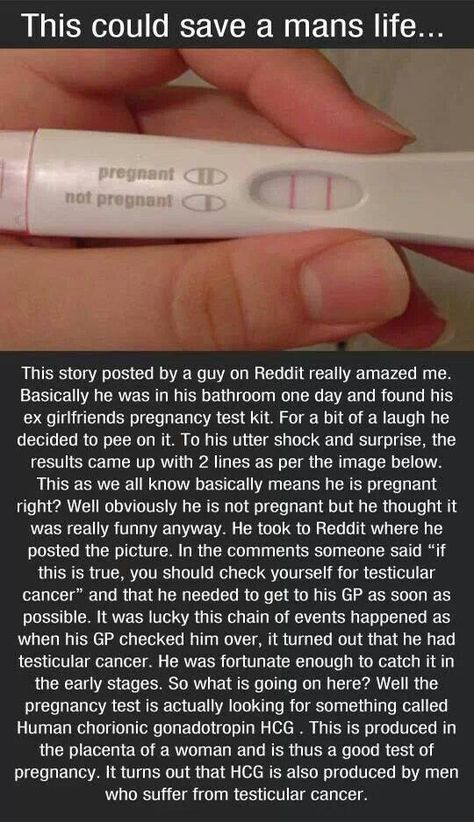
Saying goodbye to Bazanov, Bakhmetyeva answers Diana Rafailovna's call and rushes to the clinic. She replaces Kashina and finishes the operation started by that one. The child is born premature. They are engaged in Lazarev. In the morning he tells Meridiana: your child is alive, a boy, genetic analysis has come, your son has Down syndrome. Thanks, I'm aware.
Meridian is visited by her producer Vladik. He says that a child down with a star can be a reason for crazy PR: everyone just swears. Meridiana declares: you would not go to the forest with such PR.
Bakhmetyeva delivers Anastasia. Pavel arrives. Bakhmetyeva smells a strong smell of fumes from the intern. She declares that Pavel has been demoted to the orderlies for three days, and drives him away.
A husband comes to Meridiana. Upon learning that the child was born with an incurable pathology, the oligarch declares: we are breaking up, you will receive everything that is written in the contract. And the child? We have a healthy child in the contract.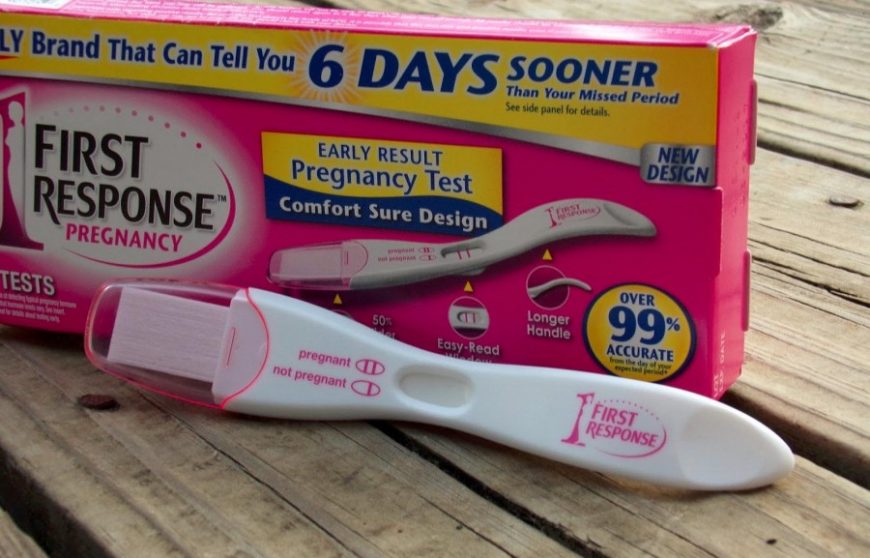 The oligarch leaves.
The oligarch leaves.
Anastasia gives birth to a healthy boy. But prisoners do not have the opportunity to raise their children.
Meridiana decides to abandon her child. She asks Bakhmetyeva and Lazarev to invite a lawyer to her.
Bazanov speaks at a medical conference at the institute where his late father taught. He tells the interns about modern IVF methods. After the lecture, graduate student Inga Elizarova meets him.
Samoryadov tells Bakhmetyeva that usually a lot of things are forgiven to the children of the authorities. But she did the right thing with Pavel: I still hope that a real doctor will come out of him. Therefore, do not forgive him for anything like this in the future.
At night, Meridiana comes to the neonatology department. She cries near the box for premature babies, asks her son for forgiveness.
The series "Pregnancy Test" (2022, Russia) 4 season 1 episode watch online in good quality Series 1
46 minutes
2. Series 2
Series 2
46 minutes
3. Series 3
45 minutes
4. Series 4
48 minutes
5. Series 5
47 minutes
6. Series 6
48 minutes
7. Series 7
51 minutes
8. Series 8
55 minutes
Description
Natalya Bakhmetyeva is a brilliant surgeon who can make difficult choices without hesitation. Her determination, which has always served as a reliable support, leads the heroine to a career dead end: Natalya comes into conflict with the hospital administration, loses her position as a leading doctor and makes a fatal mistake.